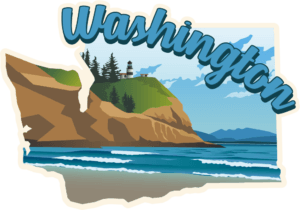This blog was last updated on November 4, 2020
Prior to the South Dakota v. Wayfair, Inc. Supreme Court decision, Washington state had already enacted rules for remote sellers and marketplace facilitators on how those businesses must collect and remit sales tax. Washington state nexus sales tax requirements were, however, altered because of the Wayfair case and Washington further adjusted its economic nexus and marketplace facilitator rules. We have highlighted key points of the most recent requirements below.
Enforcement date: 
January 1, 2020; previously October 1, 2018.
Sales/transactions threshold:
$100,000 in combined gross receipts; a 200-transaction threshold was eliminated on March 14, 2019.
Measurement period:
Threshold applies to the previous or current calendar year.
Included transactions/sales:
Combined gross receipts from all Washington sourced income.
When You Need to Register Once You Exceed the Threshold:
First day of the month that starts at least 30 days after threshold is exceeded.
Summary: Washington state Senate Bill 5581 states that from October 1, 2018 through December 31, 2019, sellers or marketplace facilitators must collect and remit sales and use taxes if the seller meets the more than $100,000 in retail sales sourced to Washington State or 200 retail sales transactions requirement. When the bill was signed on March 14, 2019, the transactions threshold was eliminated.
Businesses without physical presence in the state are required to register for tax if their cumulative gross receipts attributed to Washington exceed $100,000. Cumulative gross receipts include all of a person’s gross income of the business attributed to Washington and is not limited to the business’s retail sales.
Washington state also requires marketplace facilitators making or facilitating sales to Washington consumers to register for sales tax if they have more than $100,000 in combined gross receipts sourced or attributed to Washington, have marketplace sellers with physical presence in Washington, are organized or commercially domiciled in Washington, or have physical presence in Washington. Marketplace facilitators must collect retail sales tax, and any other taxes and fees imposed on the buyer, on behalf of the marketplace sellers.
Washington is one example of how quickly the economic sales nexus rules can change, and why businesses – including remote sellers – need to keep current on all state and local requirements.
Washington Sales Tax Resources: Do not hesitate to reach out to our team to learn more about the Washington state sales tax nexus. Additionally, check out our interactive sales tax nexus map for the most up-to-date requirements on other states.